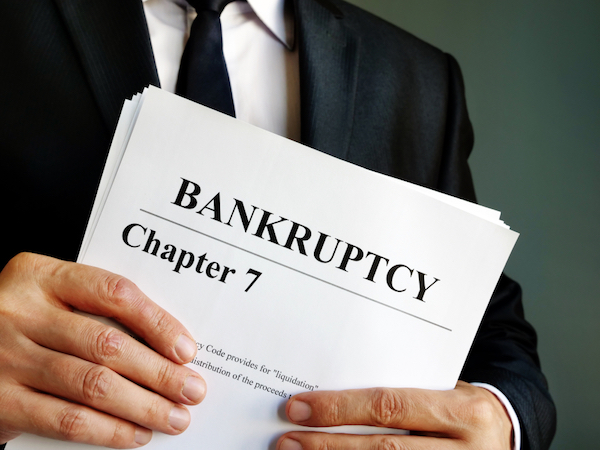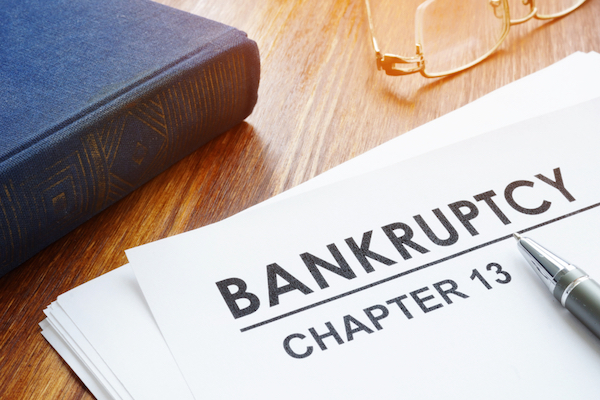Important PPP update for 2021
On December 22, 2020, Congress passed a bill renewing funding under the CARES Act, including an additional $284 billion earmarked for America’s struggling small businesses. The rules and application process for PPP loans and forgiveness have been modified, with more businesses eligible for PPP loans, more expenses forgivable, and a simplified application process. Also there is provision for “second draw” PPP loans for businesses that received PPP funding in 2020.
In this 5-minute read:
- Changes to U.S. bankruptcy law under the CARES act of 2020
- The three types of bankruptcy filings for small business
- When to consider bankruptcy
- The Small Business Reorganization Act of 2020
- Will Congress make additional changes to bankruptcy law for COVID-19?
On March 27, 2020, President Trump signed into law the CARES act for coronavirus relief, which, along with a $2 trillion stimulus package and other legislation, also made important modifications to America’s bankruptcy law where small businesses are concerned.
One important change where small business bankruptcy is concerned is the definition of “current monthly income.”
The CARES act makes any federal COVID-19 emergency income or funding small businesses exempt from consideration as “current income” under bankruptcy law, which effectively makes it easier for small businesses to be eligible for Chapter 7 liquidation, rather than be forced into Chapter 11 or Chapter 13 and forced to repay some or all of their debts.
Womply has made email marketing truly automatic for busy small business owners and all types of independent contractors. Learn more, plus get free reputation monitoring and customer insights when you sign up for Womply Free!
There are other important changes to bankruptcy law for small businesses under the CARES act, which you can read more about here. The revisions to the law under the CARES act expire one year from enactment, so if you want to take advantage of them, you need to do so before March 27, 2021.
Bankruptcy (and the revisions to the law relating to small business bankruptcy under COVID-19) can be pretty confusing, so let’s go over the basic three types of small business bankruptcy.
IMPORTANT NOTE: This article is intended for informational purposes only. You should consult a qualified bankruptcy attorney and/or a licensed business advisor familiar with bankruptcy procedures if you are considering filing for bankruptcy.
The three types of bankruptcy applicable to small businesses
Bankruptcy is a legal process that is handled in federal court, overseen by a federal bankruptcy judge. Individuals and businesses may choose to undergo bankruptcy if they are unable to pay their debts.
Fundera’s blog has an excellent breakdown detailing the three main types of bankruptcy that are relevant to American small businesses: Chapter 7, chapter 11, and chapter 13, depending on a business’s level of debt, and how it was organized.

A Chapter 7 bankruptcy filing usually means the end of your business. Your assets will be liquidated and distributed among your creditors.
If you feel you can remain in operation, but just need time to reorganize your debts and get some breathing room, you may wish to file for Chapter 11 or Chapter 13.
Let’s look at each option in a little more detail.
Chapter 7 liquidation
The most common type of bankruptcy filing, Chapter 7 is an option when you have no way to pay off your company’s current debts and you can’t keep your business running. (Individuals may also file for Chapter 7 but we’re focusing on small businesses in this article.)
The result of Chapter 7 bankruptcy is the liquidation of your business’s assets and shutting down the business for good. Multiple types of businesses (and individuals) are eligible to file Chapter 7 bankruptcy, but it’s usually used by sole proprietors, because after your creditors are paid per the agreement (and the appointed federal trustee for the case gets their fee), sole proprietors receive what’s called a “discharge.”
A discharge frees you from the responsibility of paying back the business’s debt even if you signed a personal guarantee for a loan.
NOTE: Corporations, LLCs, and partnerships can’t receive formal discharges, so if you’ve organized one of these types of businesses and signed a personal guarantee on a loan, creditors can still come after your personal assets to satisfy any debt in these cases.

Chapter 11 reorganization
If you are still able to demonstrate revenue and are not completely underwater, Chapter 11 business bankruptcy may be the right choice for your business.
Under Chapter 11, your business is allowed to stay in operation while your debts are reorganized and restructured with help from the bankruptcy court.
When you file for Chapter 11 bankruptcy reorganization, you maintain control of your company and still have the ability to make decisions, as you get approval from the bankruptcy court. Your assets are not liquidated in this case, but rather your company is reorganized in order to eliminate or restructure your business debt, sell off assets that aren’t performing, and you may also seek new financing.
Chapter 11 requires that you submit a reorganization plan to the court, detailing how and when you plan to repay all your business debt. Any creditors, as well as the court, must review and approve the plan before it is put in place.
The goal of Chapter 11 bankruptcy is to weigh your expenses vs. income, and negotiate with your creditors in order for you to become profitable again. For example, if you have business debt that is all due within 5 years, your agreement with the court and your creditors may instead give you 15 or 20 years to pay, allowing you to use your business revenue to regain profitability and solid operational ground again.
NOTE: See below for important updates to Chapter 11 bankruptcy law under the Small Business Reorganization Act and amendments under the CARES act.
Chapter 13 reorganization
Chapter 13 is a simpler, cheaper type of bankruptcy filing that mostly consumers use, but is also an option for sole proprietors with lower amounts of debt, who wish to continue operating while reorganizing/restructuring their debts instead of filing for Chapter 7 bankruptcy.

Since it’s a simpler type of filing it’s applicable only to smaller businesses without many creditors. Chapter 13 also only applies if your business debt is under a certain threshold.
If you have more than $419,275 of unsecured debt or $1,257,850 of secured debt as of April 1, 2019, you won’t qualify for Chapter 13.
One caveat for sole proprietors filing for Chapter 13 is that both personal and business debts will be reviewed. The court-appointed bankruptcy trustee will treat your personal and business property as assets that may be used to pay back all debt.
You’ll have to submit a plan to the court demonstrating how you’ll pay back your debts, typically within 3 to 5 years. For this reason as well as those noted above, typically Chapter 13 is reserved for smaller businesses with smaller amounts of debts to resolve.
However, the CARES act extends the period for Chapter 13 debt repayment up to 7 years, which effectively lowers your monthly payments to the trustee while still allowing you to remain under the protection of the bankruptcy agreement.
Is Congress considering further amendments to bankruptcy law under COVID-19?
Though the CARES act makes it easier for small businesses to qualify for Chapter 7 bankruptcy and extends the maximum repayment term for Chapter 13 bankruptcy from 5 to 7 years, many feel that American businesses need more support in bankruptcy proceedings.
The Small Business Reorganization Act, which became effective on February 19, 2020, was intended to make Chapter 11 bankruptcy filing quicker, simpler, cheaper, and more accessible for businesses. Read an excellent summary here.
The CARES act extended the benefits of the SBRA further, by raising the maximum debt limit for businesses wishing to file for bankruptcy protection from $2,725,625 to $7,500,000, for filings over the next year. (As noted above, the modifications and extensions to bankruptcy law effective under the CARES act will expire on March 27, 2021).
Forbes contributor Jay Adkisson is one expert advocating for more COVID-19 amendments to current bankruptcy law, primarily relating to the need for more simple and timely (and cheaper) filing
Typically, bankruptcy proceedings take between 4 months to a year, depending on what type of bankruptcy you are filing for, and the court trustee takes a healthy chunk of the money as a fee.
Adkisson says that many small businesses may be saved if Congress can enact an “EZ chapter 11” filing procedure which may help “flatten the curve” of small business failures due to COVID-19. He also advocates enacting a law permitting a greatly reduced payment of expenses such as business rent for the first few months after filing, and gradually increasing the payments to the full amount.

This would theoretically allow businesses more breathing room to meet expenses during the period they are shut down or severely hampered by COVID-19 related restrictions, and would reduce the number of businesses that fail completely
Whether this type of modification to bankruptcy law will come in time to help businesses reeling from the effects of COVID-19 remains to be seen, but we’ll be sure to keep you updated on any important developments.
Win new customers and build loyalty with your existing customers with Womply Email Marketing
Womply has made Email Marketing truly automatic for busy small business owners, independent contractors, and sole proprietors. Womply helps you turn customers into regulars and get more repeat business with targeted emails that send automatically when customers transact with you. Build customer loyalty and revenue, and get more repeat business with just a few clicks!
Learn more, plus get free reputation monitoring and customer insights when you sign up for Womply Free!
Sources:
https://www.forbes.com/sites/jayadkisson/2020/04/06/americas-small-businesses-need-immediately-an-ez-chapter-11-filing-procedure-to-flatten-the-curve-of-failures-from-covid-19/
https://www.financialservicesperspectives.com/2020/03/congress-third-major-coronavirus-legislation-makes-bankruptcy-relief-for-potential-and-current-individual-debtors-easier/
https://www.jdsupra.com/legalnews/cares-act-makes-small-business-40996/